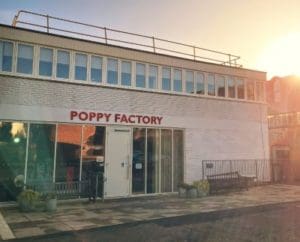We are delighted to award a £100,000 grant to The Poppy Factory, to fund the charity’s employment services for Army veterans.
The Soldiers’ Charity has a long-standing funding relationship with The Poppy Factory, which has been helping veterans back into work for over a hundred years. The charity’s specialist Employment Service helps those most vulnerable to mental and physical health conditions; 80 per cent of its beneficiaries are former soldiers.

During the period covered by our last grant, 365 Army veterans registered with The Poppy Factory’s employment service, 220 started in new jobs and 21 benefited from training grants. Transport and Logistics has proved to be the most popular employment sector for veterans, followed by Construction and Labouring, and Security and Safety.
Former soldier Carly is one of the beneficiaries we have assisted through The Poppy Factory. After working with Andrew, an Employment Consultant, Carly said: “He has helped me believe in myself again. My thanks to The Poppy Factory and Army Benevolent Fund for supporting veterans like me in my time of need.”
Amanda Shepard, Chief Executive of The Poppy Factory, said:
“The Soldiers’ Charity has long been a key supporter of our service, recognising how pivotal our support can be in helping veterans with health conditions move towards a more positive future through employment. We are very grateful for this substantial new grant, which will help us provide life-changing employment support to hundreds more veterans in communities across England and Wales.”

Brigadier (Ret’d) Peter Monteith, Chief Operating Officer, Army Benevolent Fund, added:
“The Poppy Factory provides first rate employment services for Army veterans, many of whom are vulnerable and face complex challenges as they reintegrate back into civilian life. Helping veterans to secure stable employment is an important priority for our charity, especially in these economically challenging times with an uncertain labour market and increased cost of living.”
Read more about The Poppy Factory’s work here.

